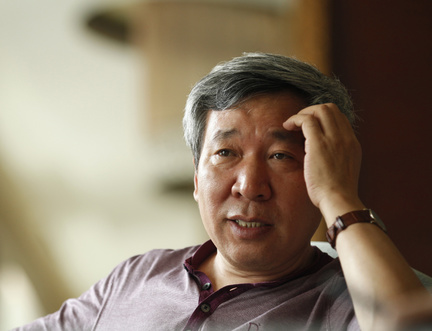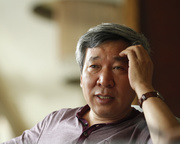中国笼鸟 / China's Caged Birds
By Yan Lianke

In 2018, we commissioned 51 authors from 25 countries to write essays exploring ideas about freedom for The Freedom Papers, a publication produced in partnership with Gutter Magazine. Read on for Yan Lianke's essay (in both Chinese and English), and visit guttermag.co.uk to purchase a copy of The Freedom Papers.
谈论自由,在我是一种奢侈,仿佛渊暗处的荆野,每日望着一束光暖从它面前悄然走过,而不曾得到那光暖的多少照耀。世界已经被上帝划定了各种区域,注定有的地方光足到炎热难耐,对光的挥霍,如要脱掉身上多余的衣物;而有的地方,寒冷久远,看见从门前静静流过去的光,会如饥饿濒死之人,看到了被扔掉的一盒食物般。这亦如一只被关在鸟笼里的鸟,为了能让主人每天把它提到门外去,挂至檐下或树上,就倾其所有而歌唱,哪还敢奢求自己有一日飞向天空去滑翔,或者在任意的枝头跳跃和啾啁。
中国人近年爱说一句切肤而又轻趣的话: ‘有人活着可以挥金如土,而有的人仅仅为了活着,却已经竭尽全力。’这也正如那只被关在笼里的鸟,其全部的努力,也就是讨好主人,恩准将它从阴暗的屋角,挂到屋外明亮的檐下。但也因为这一挂,它却看见了蓝天、白云、日光和从这儿飞到哪儿去的同类们,明白了那些身心二间,皆俱都有的自我、自在的大自由,正如它的同类在旷野中饥可觅食、渴有水饮,而在肉身饱食之后,又可身随心欲,心跟神去的飞翔与鸣叫,过一种既可攀枝而歌,又可凝云滑翔,也还可以无所事事时,随意在哪儿鸣叫或嬉戏的那种真正属于鸟类的自由之生活。
于是鸟笼里的鸟,就每日望着笼外的鸟,忖思了有关自由的三种境界和境况:一是身心二间俱有的大自由;身心合一,去来由己,把生死命运交给天空、荒野和枝丫。二是饱食肉身,为主人歌唱,以歌声换食粮,以美羽换笼门,可以出笼飞在主人的手上或肩头,再或主人家的椅背上、桌子上,甚或去落在主人家庭院、花园的枝头上,过一种日起出笼、日归而归的有限的肉身自由之生活。第三种,就是那种永远训练不好的笼中的八哥和鹦鹉,无论你怎样以饥饿、美食、渴饮来折磨或者引诱它,它都饿极不食,渴极不饮,只是一味的从笼子的缝隙望出去,死死盯着笼外的天地、枝叶和旷野,身在笼子内,心在笼子外;宁可身子死,也求心自由。如此也就终于有一天,主人将笼里的粮食和笼外的死亡掷在它面前,由它二择一选时,笼里的鸟,义无反顾的选择了笼外之死亡。
主人就把这鸟摔死在笼子外面了,将其尸体抛在了天空和旷野。从此这个已经饿到只有骨头和枯干羽毛的鹦鹉或八哥,生命就从世界上消失了,魂灵便在天空飞翔了。当然也从此,鹦鹉的种类里,有了一种 ‘不笼鹦’,它们是一种不易人驯的鸟,人们在养驯鹦鹉时,从不收养、笼驯这种不笼鹦。也从此,这种鹦类中最不被人待见的不笼鹦,就成了终日和终生,都在旷野、天空翔飞自 由、无羁无绊的自由鸟。也由此,使人想到今日中国人的生活和中国作家之写作,恰在笼鸟忖思的第二种境界里——物质丰肥,精神瘦枯,每天在规划的范围内起音唱歌、蹁跹舞蹈,但他(她)也因此,正可以嘲笑永远在笼里出不来的人和永远不被笼子喜爱的人,如在笼里肥食足水的八哥、鹦鹉般,落在门口定规的枝头上,讨欢主人,嘲笑路人,看到旷野风雨中觅食不得的同类们——尤其那些因为无边的自由,而撞在荒枝野木上头破血流的,不免会由衷地生出声震寰宇的笑;而看到被主人提在笼里永远没有出过笼的鸟,又不免会生出不屑的白眼和睥睨之言语,说对方连笼外的空气都未曾呼吸过,更不要说用翅膀在天空滑翔奋飞了。进而言至我们的写作去,也正是这样的范围和腔调,嘲弄西方对传统的丢弃和失守,被无边的自由所放逐;批评东方他人的不现代,正被一种毫无自由的羁绊所笼牢,而只有我们自己、自己的,方是最好、最好的。
至于我,大约也是这样一种人——只不过是一个近乎无耻到总是吃着人家的饭,而又挑剔饭菜做得不好的人;是一只吃住都在人家的笼子里,又总是盯着笼外天空的鸟。可要让自己真的去做一只不怕死的不笼鸟,便会觉得不如像肖斯塔科维奇那样活下去,其时创作的交响曲,不也正是一种笼鸟的伟大艺术嘛;而从天空传来的不笼鸟的自由歌,说不定还要归位到天空中的噪音里边呢。
***
Translated by Esther Tyldesley
When talking of freedom, for me it is a kind of luxury. It is like gazing every day, from deep within a dark wilderness of thorns, at a ray of light and warmth as it passes silently by, without ever gaining any real warmth or illumination from the light. God has divided up the world into many different regions, and in some of these light is ample to the point of blazing heat and discomfort, to be squandered the way you would throw off excess clothing; whereas other places are bitterly cold, and there they watch the light slip silently past the doorway, as a starving man watches as a box of food is thrown away. It can also be likened to a bird that has been shut in a cage, which pours everything it has into its song so that its owner will carry it outside every day, and hang it under the eaves or from the branch of a tree.
In recent years, a saying has become popular among Chinese people, witty but uncomfortably near the bone: ‘Some people live to spend money like water, while others have to struggle with all they have just to live’. It is the same for a bird shut up in a cage: all of its efforts go towards pleasing its owner, so that he will graciously permit the cage to be brought from the dark corner of the room and hung under the eaves outside where the light shines brightly. But hanging there in its cage, the bird has seen the blue sky, white clouds and the light of the sun, and other birds who can fly here, there and everywhere, and it has come to understand the great freedom of being oneself and living as one likes, a freedom of both body and soul, just like its counterparts out there in the wild who can forage for food when hungry, and drink when thirsty, yet after their bodies are fed, they can fly and sing at will too, wherever their hearts take them, living that life of true freedom that a bird should have: they can climb to the branches and sing, fly and soar high in the clouds, and when they have nothing else to do, they can sing and play as the fancy takes them.
And so the birds in their cages, staring out every day at the birds outside the cage, contemplate three degrees of freedom. The first is the freedom of both the body and the mind, in which heart and body are one: to come and go at their own will, their lives, death and fates given over to the skies, the wilds and the branches. The second is to be well fed and well tended, while singing for one’s master, exchanging song for rations, trading fine feathers for the open cage door; they can leave to fly to their master’s hand or shoulder, or to the table or a chair back in their master’s house, or even alight on a branch in their master’s courtyard or garden, living a life of limited physical freedom where they leave the cage at dawn and return at night. The third is the kind of mynah bird or parrot which can never be trained to accept a cage: no matter whether you use hunger, delicious food or thirst to torment it or tempt it, it will take no food even when it is starving, and drink nothing when dying of thirst; it will do nothing but gaze out from between the bars of its cage, staring fixedly at the skies and the earth, the branches and leaves and the wilderness outside its cage. Its body is in the cage, but its heart is outside it, craving freedom of the heart even at the price of its own physical death. When the day finally comes when the owner presents it with a choice between food inside the cage and death outside it, this caged bird will choose death outside the cage without a backward glance.
The owner has thrown the bird to its death outside the cage, and cast away its body to the skies and the wilderness. From then on, the life of this parrot or mynah bird, now a starved bag of bones and brittle, dry feathers, has vanished from the world, but its spirit has flown off to the skies. From then on, inevitably, a new sub-species will appear among the many different varieties of mynah bird and parrot, a ‘no-cage bird’, which cannot easily be tamed, and which parrot fanciers never even attempt to rear, or to train up to a cage. And also from then on, parrots such as this, the kind that no self-respecting keeper of birds would have anything to do with, have thus become free birds, flying at liberty in the wilds and in the skies, living a free, unconfined life until the end of their days. This in turn recalls the lives of today’s Chinese people, and the writings of China’s writers, who are located squarely in that second degree of freedom – materially comfortable, even luxurious, but spiritually starved, every day singing, twirling and prancing within their defined limits. But because of this, they are ideally placed to mock those people who are permanently caged, never to leave, and those who have never been cherished and cared for in a cage. Like the well fed, well watered mynah bird or parrot in its cage, perching on its designated twig by the door, making up to its owner, mocking passers by, they look on their fellow birds who search in vain for food in the windy, rainy wilderness outside – especially those who in their limitless freedom crash headfirst into the branches of the wild trees and crack their heads open – and cannot help bursting into squawks of raucous laughter. On the other hand, on seeing birds that are carried around by their owners in cages and have never set foot outside, they cannot stop themselves from rolling their eyes in disdain and dismissing them with scornful words, saying that they have never even taken a breath of outside air, let alone used their wings to soar and glide in the sky. To extend this a step further to our writing, this is precisely our scope of activity and our tone, mocking the West for its lost, poorly guarded traditions, which have been abandoned to limitless freedom; yet criticising other people in the East for their lack of modernity, their cage-bound nature, their utter lack of liberty: it is only we ourselves, and our own things, which are the best, the very, very best.
As for me, I am no doubt exactly this kind of person – indeed, I am dangerously close to being the kind of shameless individual who is always eating other people’s food, but picks at their dinner and complains about the taste; I am the kind of bird that lives and eats in someone else’s cage, but is always staring at the sky. However, if you were to ask me to take my life in my hands and become a no-cage bird in truth, I would feel that it would be better to be like Shostakovich, to carry on living, creating my symphonies in due season: is this not also great art from a caged bird? And as for the songs of freedom of the uncaged birds that drift down from the sky, there is a good chance that these songs will return to the skies, lost in all the other background noise.
Copyright © 2018, Yan Lianke. All rights reserved.
Supported by the Scottish Government’s Edinburgh Festivals Expo Fund through Creative Scotland.
Look, Listen & Read
- 2026 Festival:
- 15-30 August
Latest News
 Major new partnership with Celtic Connections
Major new partnership with Celtic Connections




